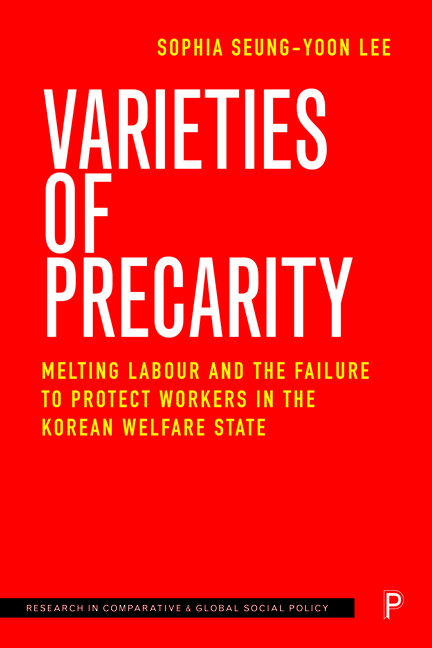 Varieties of Precarity
Varieties of Precarity Book contents
- Frontmatter
- Contents
- Series editors’ preface
- List of figures and tables
- Acknowledgements
- 1 Introduction: Melting labour and institutional inconsistency
- 2 Social protection policies and the South Korean labour market in comparative perspective
- 3 When insiders are kicked out: layoffs of regular workers in manufacturing
- 4 Same boat, different destiny: subcontracted workers in the Korean shipbuilding industry
- 5 Young and old outsourced female workers in call centres and cleaning services
- 6 Are freelancers really free? The Korean freelance labour market and the precarity of young freelancers
- 7 The digital precariat: various Korean platform workers and the new work logic
- 8 Conclusion: Towards universal institutional protection for precarious workers in the era of melting labour
- Notes
- References
- Index
1 - Introduction: Melting labour and institutional inconsistency
Published online by Cambridge University Press: 03 April 2024
- Frontmatter
- Contents
- Series editors’ preface
- List of figures and tables
- Acknowledgements
- 1 Introduction: Melting labour and institutional inconsistency
- 2 Social protection policies and the South Korean labour market in comparative perspective
- 3 When insiders are kicked out: layoffs of regular workers in manufacturing
- 4 Same boat, different destiny: subcontracted workers in the Korean shipbuilding industry
- 5 Young and old outsourced female workers in call centres and cleaning services
- 6 Are freelancers really free? The Korean freelance labour market and the precarity of young freelancers
- 7 The digital precariat: various Korean platform workers and the new work logic
- 8 Conclusion: Towards universal institutional protection for precarious workers in the era of melting labour
- Notes
- References
- Index
Summary
The precariat in South Korea
The combination of the Korean welfare state and its labour market is puzzling. In this book, I embark on a journey to unravel the complex relationship between the evolving landscape of melting labour and the inadequacies of institutional protections in the Korean welfare state. South Korea (hereafter, Korea) is often recognised as the most typical case of the East Asian miracle, characterised by broadly fair income distribution without prominent welfare politics representing income, wealth redistribution or labour. The puzzle lies in understanding why, despite achieving economic affluence and rapid institutional development in welfare institutions, Korea has witnessed a distinctively high rate of new forms of precarious work since the 2000s. Why and how does the compressed institutional development of the welfare state fail to protect precarious workers in Korea? In this book, I argue that the mismatch between the institutional combination established during the compressed welfare state development and the melting labour, which has increased precarious work, is at the core of this issue. I will explain how this mismatch renders the old institutions obsolete, employing the concept of policy ‘drift’.
As the traditional boundaries of work disintegrate and give way to fissured workplaces, the Korean welfare state’s reliance on the standard employment relationship proves increasingly insufficient in addressing the challenges of the modern labour market. The central thesis of this book is that the inconsistencies between institutional decommodification and the evolving nature of labour contribute to the expansion of diverse forms of precarity.
In Korea, economic growth led to a rapid expansion of wage workers and increased real household income. Without the welfare politics of wealth redistribution, Korea achieved compressed development in its welfare institutions within 30 years, creating a social insurance system set in most major risk areas and adopting a universalistic family policy. The social insurance system started as loyalty incentives given to the ruling group of state institutions, such as bureaucrats, professional soldiers and police officers (Lee G.C., 2009). The modern Korean social insurance system stems from the social security laws introduced in the 1960s (Won S.J., 2013).
- Type
- Chapter
- Information
- Varieties of PrecarityMelting Labour and the Failure to Protect Workers in the Korean Welfare State, pp. 1 - 33Publisher: Bristol University PressPrint publication year: 2023


